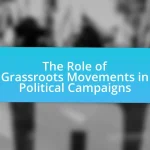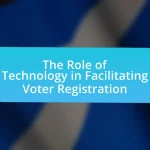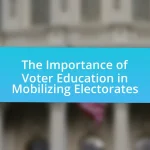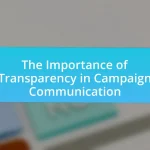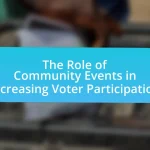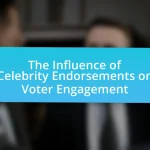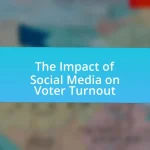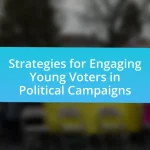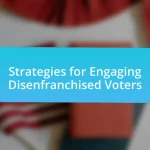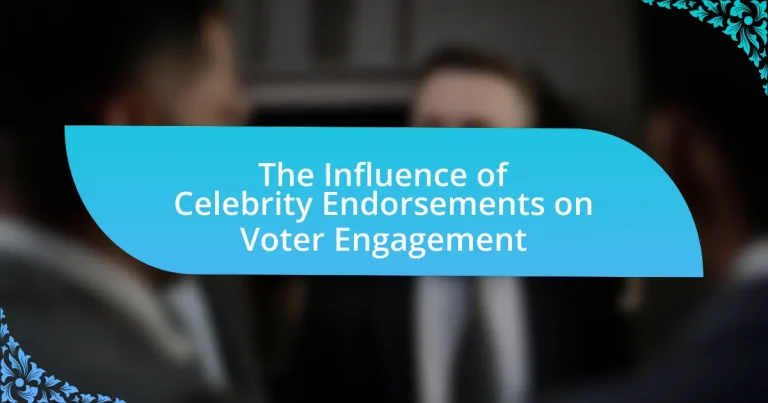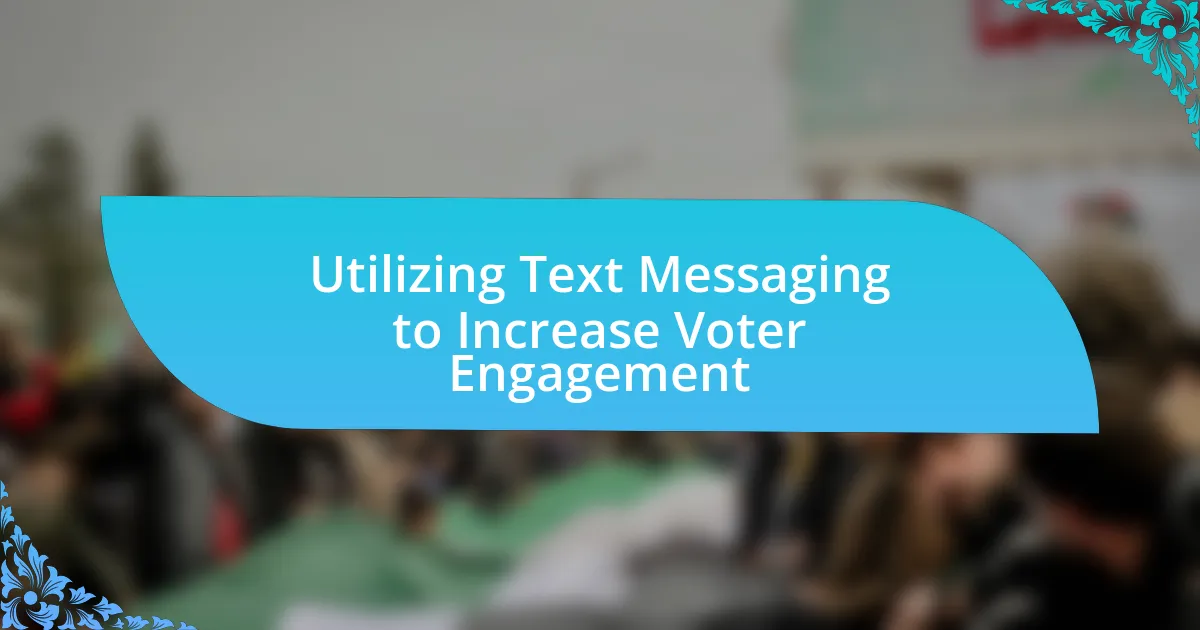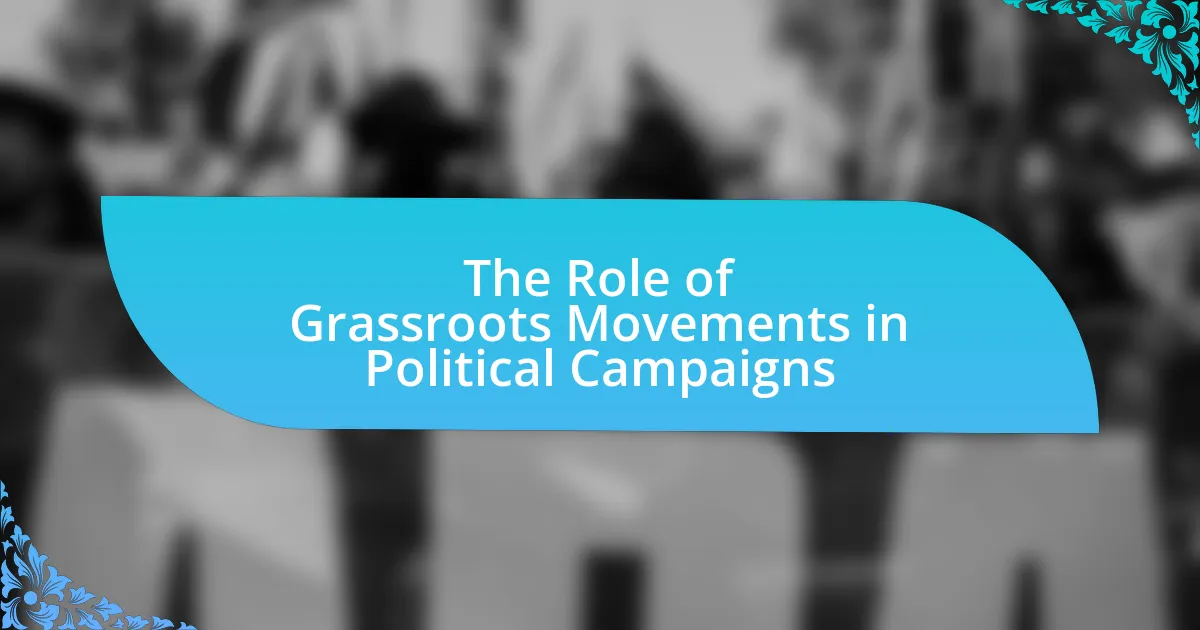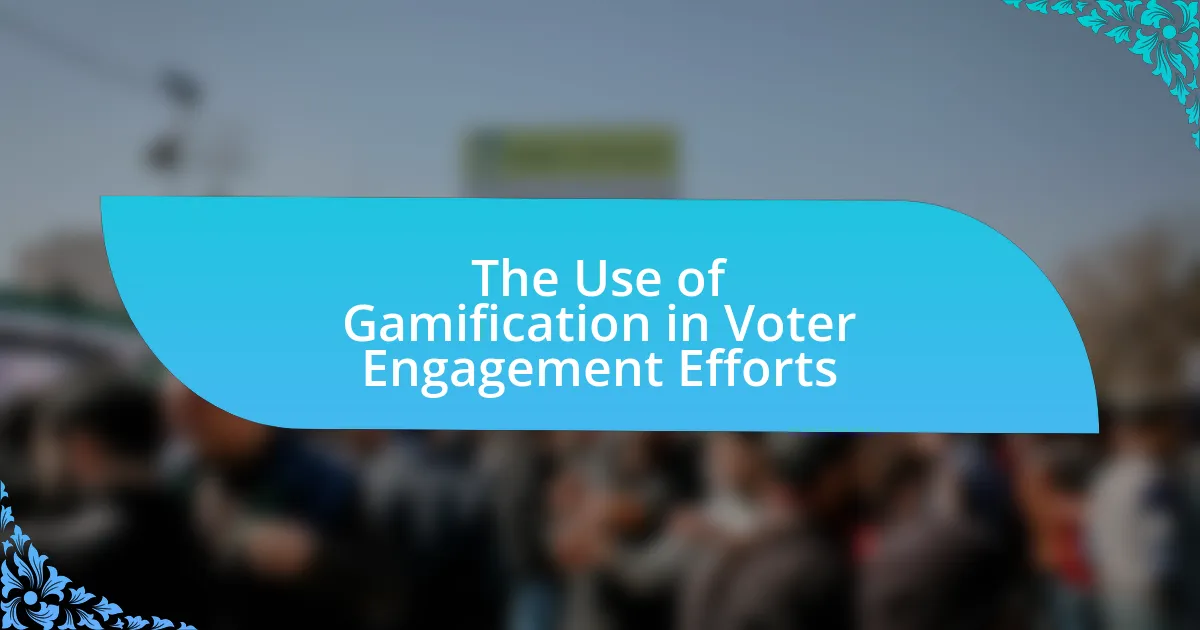The article examines the influence of celebrity endorsements on voter engagement, highlighting their significant role in motivating participation, particularly among younger demographics. Research indicates that endorsements can lead to increased voter turnout, enhance candidate credibility, and shape public perceptions. The article explores various psychological mechanisms at play, the impact of different types of celebrities, and the effectiveness of these endorsements compared to traditional campaign strategies. Additionally, it addresses potential drawbacks, such as the risk of superficial engagement and voter disillusionment, while providing insights into best practices for leveraging celebrity influence in political campaigns.
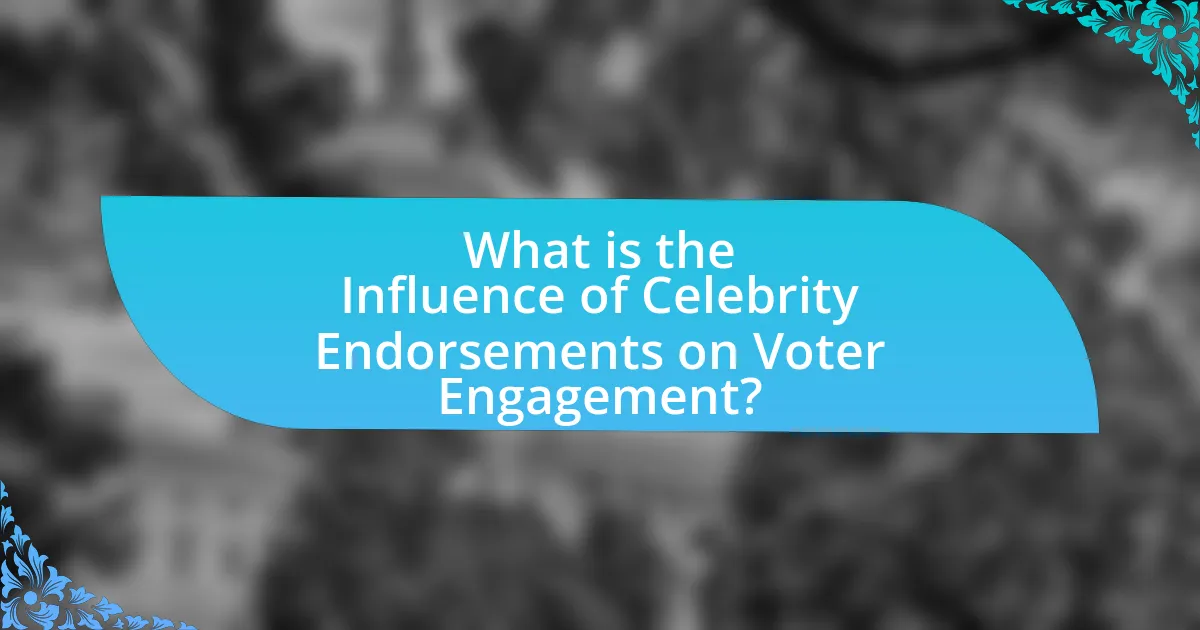
What is the Influence of Celebrity Endorsements on Voter Engagement?
Celebrity endorsements significantly enhance voter engagement by leveraging their influence to motivate fans and followers to participate in elections. Research indicates that when celebrities endorse candidates or causes, they can increase voter turnout, particularly among younger demographics. For instance, a study published in the journal “Political Behavior” found that celebrity endorsements can lead to a 10% increase in voter turnout among 18 to 24-year-olds. This effect is attributed to the perceived credibility and relatability of celebrities, which can inspire individuals to take action and engage in the political process.
How do celebrity endorsements impact voter behavior?
Celebrity endorsements significantly impact voter behavior by increasing awareness and shaping perceptions of candidates. Research indicates that endorsements from well-known figures can enhance a candidate’s appeal, particularly among younger voters who may be more influenced by celebrity culture. For instance, a study published in the Journal of Political Marketing found that celebrity endorsements can lead to a 10-20% increase in voter turnout among targeted demographics. This effect is attributed to the ability of celebrities to engage audiences emotionally and lend credibility to political messages, thereby motivating individuals to participate in elections.
What psychological mechanisms are at play in celebrity endorsements?
Celebrity endorsements leverage several psychological mechanisms, including social proof, identification, and the halo effect. Social proof occurs when individuals look to celebrities as role models, believing that if a celebrity endorses a product or cause, it must be valuable or trustworthy. Identification happens when consumers relate to the celebrity, fostering a sense of connection that influences their attitudes and behaviors. The halo effect leads consumers to transfer their positive feelings about the celebrity to the endorsed product or cause, enhancing its perceived credibility and appeal. Research indicates that these mechanisms significantly impact consumer behavior, as evidenced by a study published in the Journal of Advertising Research, which found that celebrity endorsements can increase purchase intentions by up to 37%.
How do endorsements affect voter perceptions of candidates?
Endorsements significantly enhance voter perceptions of candidates by increasing their credibility and appeal. Research indicates that endorsements from trusted figures, such as celebrities or political leaders, can sway undecided voters and reinforce the preferences of supporters. For instance, a study by the Pew Research Center found that 60% of voters reported being influenced by endorsements when making their electoral decisions. This influence stems from the perception that endorsed candidates possess qualities valued by the endorser, thereby enhancing their overall image and likability among the electorate.
Why are celebrity endorsements significant in political campaigns?
Celebrity endorsements are significant in political campaigns because they can enhance a candidate’s visibility and credibility, thereby influencing voter engagement. Research indicates that endorsements from well-known figures can sway public opinion, particularly among younger voters who may be more inclined to support candidates endorsed by celebrities they admire. For instance, a study published in the Journal of Political Marketing found that celebrity endorsements can increase voter turnout by as much as 10%, demonstrating their effectiveness in mobilizing support.
What role do celebrities play in shaping public opinion?
Celebrities significantly influence public opinion by leveraging their visibility and popularity to shape perceptions on various social and political issues. Their endorsements can sway public attitudes, as seen in the 2008 U.S. presidential election when celebrities like Oprah Winfrey and Jay-Z endorsed Barack Obama, contributing to increased voter engagement among younger demographics. Research indicates that celebrity endorsements can enhance the credibility of political messages, making them more relatable and persuasive to the general public. For instance, a study published in the Journal of Communication found that individuals exposed to celebrity endorsements were more likely to support the endorsed candidate, demonstrating the tangible impact celebrities have on shaping public opinion and voter behavior.
How do endorsements influence turnout among different demographics?
Endorsements significantly influence voter turnout among different demographics by enhancing the perceived credibility and appeal of candidates. Research indicates that endorsements from trusted figures, such as celebrities or community leaders, can mobilize specific demographic groups, particularly younger voters and minority communities, who may feel more connected to the endorsers. For instance, a study by the Pew Research Center found that 50% of young voters reported being more likely to vote when a celebrity they admire endorses a candidate. This effect is amplified in demographics that traditionally have lower turnout rates, as endorsements can bridge the gap between political engagement and personal relevance.
What are the potential drawbacks of celebrity endorsements in politics?
Celebrity endorsements in politics can lead to a lack of authenticity and informed decision-making among voters. When celebrities endorse political candidates, they may prioritize their personal brand over the candidate’s policies, which can mislead voters about the candidate’s qualifications and positions. For instance, a study by the Pew Research Center found that younger voters are more likely to be influenced by celebrity endorsements, potentially resulting in superficial engagement with political issues rather than a deep understanding of the candidates’ platforms. Additionally, celebrity endorsements can polarize public opinion, as fans may support a candidate based solely on the celebrity’s influence rather than the candidate’s merits, leading to increased division among voters.
How can celebrity endorsements lead to voter disillusionment?
Celebrity endorsements can lead to voter disillusionment by creating a perception that political decisions are influenced more by popularity than by policy. When celebrities endorse candidates, they often prioritize personal charisma over substantive political issues, which can alienate voters who seek genuine representation and informed debate. Research indicates that voters may feel manipulated or misled when they perceive endorsements as superficial, leading to skepticism about the authenticity of the political process. For instance, a study published in the Journal of Political Marketing found that celebrity endorsements can diminish trust in candidates, as voters may question the motives behind the endorsement rather than focusing on the candidates’ qualifications or policies.
What are the risks of relying on celebrity influence in campaigns?
Relying on celebrity influence in campaigns poses several risks, including potential alienation of the target audience and the risk of backlash if the celebrity’s personal life or actions contradict the campaign’s message. For instance, a study by the American Psychological Association found that celebrity endorsements can lead to skepticism among voters if the celebrity is perceived as out of touch with the average citizen’s experiences. Additionally, if a celebrity becomes embroiled in controversy, it can negatively impact the campaign’s credibility and effectiveness, as seen in the case of a political campaign that faced criticism after a celebrity spokesperson was involved in a scandal. These factors highlight the precarious nature of leveraging celebrity influence in political campaigns.
How do celebrity endorsements compare to traditional campaign strategies?
Celebrity endorsements significantly enhance voter engagement compared to traditional campaign strategies. Research indicates that campaigns featuring celebrities can increase message recall and emotional connection, leading to higher voter turnout. For instance, a study published in the Journal of Advertising Research found that celebrity endorsements can boost campaign effectiveness by up to 20% in terms of voter mobilization. In contrast, traditional strategies often rely on direct mail and television ads, which may not resonate as strongly with younger voters. Thus, the integration of celebrity endorsements into campaign strategies can create a more impactful and relatable message, ultimately driving greater voter participation.
What factors contribute to the effectiveness of celebrity endorsements?
The effectiveness of celebrity endorsements is primarily influenced by the celebrity’s credibility, attractiveness, and relevance to the target audience. Credibility is established through the celebrity’s perceived expertise and trustworthiness, which can significantly enhance the persuasive power of the endorsement. For instance, a study published in the Journal of Advertising Research found that endorsements from credible celebrities can increase consumer trust and purchase intention by up to 50%. Attractiveness, both physical and personality-wise, also plays a crucial role; research indicates that consumers are more likely to engage with brands endorsed by attractive celebrities, as they evoke positive feelings and associations. Lastly, the relevance of the celebrity to the product or cause being endorsed is vital; endorsements are more effective when the celebrity has a genuine connection to the brand or message, as this authenticity resonates with the audience, leading to higher engagement rates.
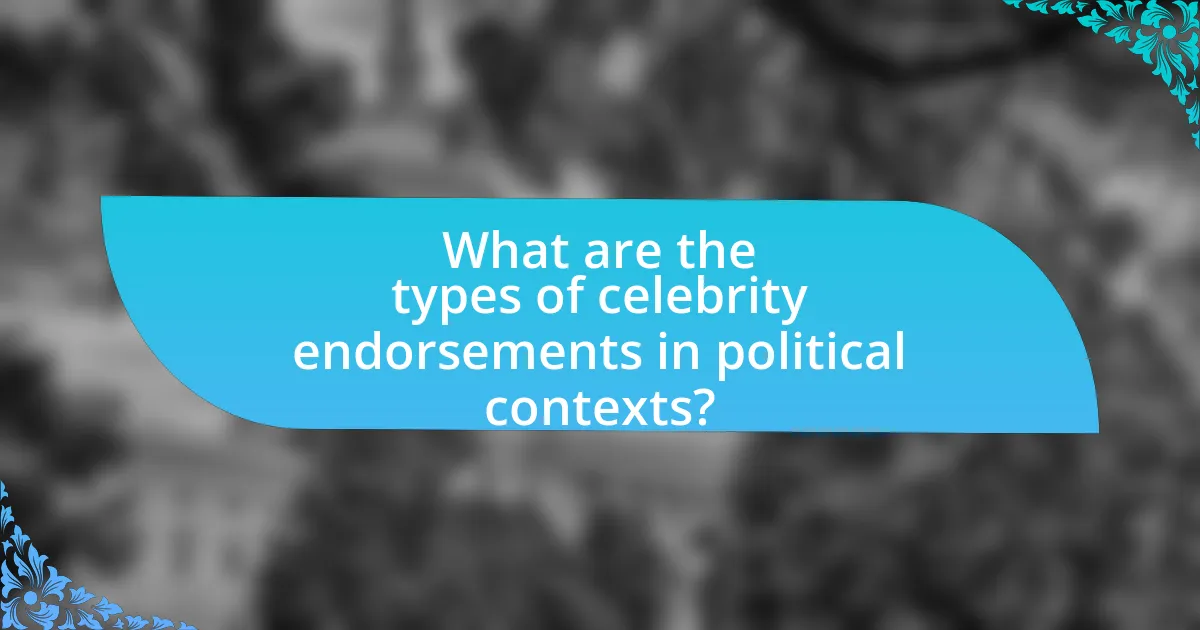
What are the types of celebrity endorsements in political contexts?
Celebrity endorsements in political contexts primarily fall into three types: direct endorsements, issue advocacy, and fundraising support. Direct endorsements occur when a celebrity publicly supports a candidate, influencing their fan base to consider that candidate, as seen with celebrities like Oprah Winfrey endorsing Barack Obama in 2008. Issue advocacy involves celebrities promoting specific political issues or causes, which can mobilize public opinion and voter engagement, exemplified by Leonardo DiCaprio’s environmental activism. Fundraising support includes celebrities participating in events or campaigns to raise money for candidates, such as when Taylor Swift hosted a fundraiser for Democratic candidates in 2018. Each type leverages the celebrity’s influence to enhance voter engagement and awareness in political processes.
How do different types of celebrities influence voter engagement?
Different types of celebrities influence voter engagement through their ability to reach diverse audiences and shape public opinion. For instance, actors and musicians often leverage their platforms to mobilize younger voters, as seen in the 2020 U.S. elections where celebrities like Taylor Swift and Billie Eilish encouraged their fans to register and vote, resulting in a significant increase in voter turnout among the 18-29 age group. Additionally, athletes can impact voter engagement by addressing social justice issues, exemplified by LeBron James, who founded the “More Than a Vote” initiative to combat voter suppression, thereby galvanizing support and participation in the electoral process. Research indicates that celebrity endorsements can enhance the perceived importance of voting, as they often bring attention to specific issues and motivate fans to engage politically.
What is the impact of local versus national celebrities on voter turnout?
Local celebrities generally have a more significant impact on voter turnout compared to national celebrities. This is primarily because local celebrities are often more relatable to the community, fostering a sense of connection and trust that can motivate individuals to participate in elections. Research indicates that endorsements from local figures can increase voter turnout by as much as 10% in local elections, as seen in studies conducted during municipal elections in various U.S. cities. In contrast, national celebrities may raise awareness but often lack the personal connection that drives local engagement, resulting in a less pronounced effect on voter turnout.
How do endorsements from social media influencers differ from traditional celebrities?
Endorsements from social media influencers differ from traditional celebrities primarily in their authenticity and audience engagement. Social media influencers often cultivate a more personal and relatable connection with their followers, leading to higher levels of trust and engagement; for instance, a study by the Digital Marketing Institute found that 70% of millennials are influenced by the recommendations of their peers, including influencers, compared to only 33% who trust traditional celebrity endorsements. Additionally, influencers typically have niche audiences, allowing for targeted messaging that resonates more deeply with specific demographics, which contrasts with traditional celebrities who often appeal to broader audiences. This difference in connection and audience specificity can significantly impact voter engagement, as influencers can mobilize their followers more effectively around political causes or candidates.
What strategies do campaigns use to leverage celebrity endorsements?
Campaigns leverage celebrity endorsements through strategies such as targeted messaging, social media engagement, and event appearances. Targeted messaging involves aligning the celebrity’s image and values with the campaign’s goals to resonate with specific voter demographics. For instance, a campaign may use a celebrity known for advocacy in social justice to appeal to younger voters concerned about equity issues. Social media engagement capitalizes on the celebrity’s follower base, amplifying the campaign’s reach; studies show that posts featuring celebrities can increase engagement rates by up to 50%. Event appearances allow celebrities to draw crowds and media attention, creating a buzz around the campaign. For example, when a popular musician performs at a rally, it can attract thousands of attendees, thereby enhancing voter turnout and interest.
How do campaigns select the right celebrity for endorsement?
Campaigns select the right celebrity for endorsement by evaluating alignment with brand values, audience demographics, and the celebrity’s public image. This process involves analyzing the celebrity’s influence on target voter segments, ensuring that their persona resonates with the campaign’s message. For instance, a study by the Journal of Advertising Research found that endorsements from celebrities who share similar values with the brand can increase consumer trust and engagement by up to 50%. Additionally, campaigns often consider the celebrity’s social media reach and engagement metrics, as these factors significantly impact voter mobilization and awareness.
What methods are used to amplify the reach of celebrity endorsements?
Methods used to amplify the reach of celebrity endorsements include social media campaigns, strategic partnerships, and multimedia content creation. Social media platforms like Instagram and Twitter allow celebrities to share endorsements with millions of followers instantly, increasing visibility. Strategic partnerships with brands or organizations can leverage the celebrity’s influence to reach broader audiences, as seen in campaigns like Michelle Obama’s “Let’s Move!” initiative, which combined celebrity endorsements with public health messaging. Additionally, multimedia content such as videos, podcasts, and live events can engage audiences more deeply, enhancing the impact of the endorsement. These methods collectively enhance the effectiveness and reach of celebrity endorsements in various contexts, including voter engagement.
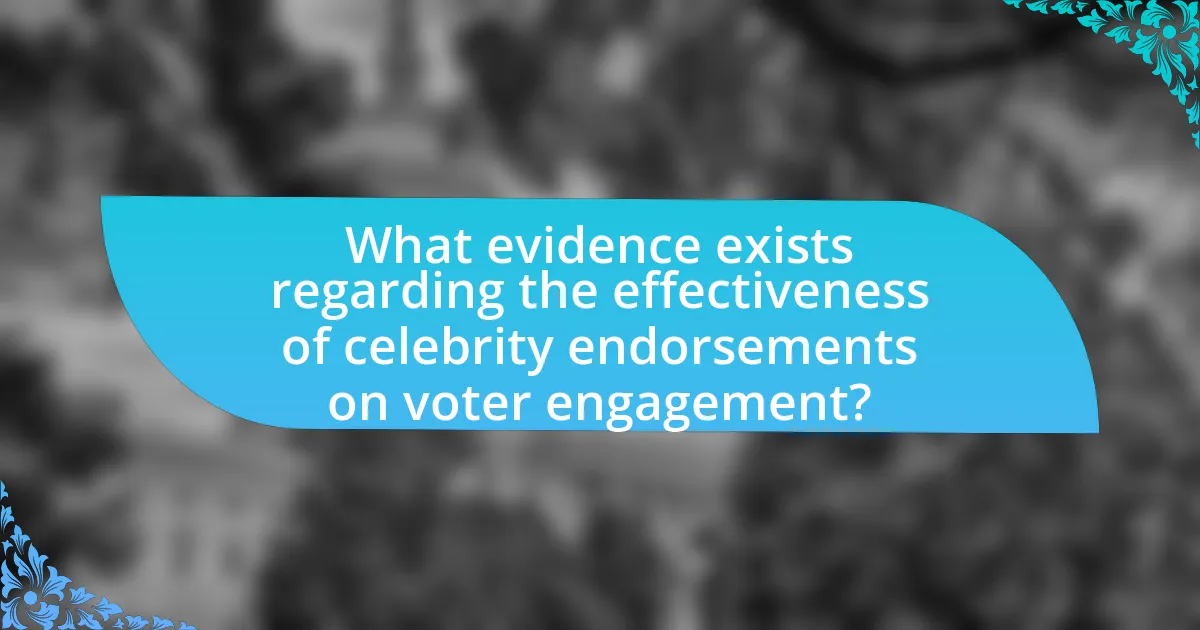
What evidence exists regarding the effectiveness of celebrity endorsements on voter engagement?
Evidence indicates that celebrity endorsements significantly enhance voter engagement, particularly among younger demographics. Research conducted by the Harvard Kennedy School found that celebrity involvement in political campaigns can increase voter turnout by as much as 10% among 18 to 29-year-olds. Additionally, a study published in the Journal of Advertising Research highlighted that endorsements from well-known figures can improve the perceived credibility of political messages, leading to increased interest and participation in elections. These findings demonstrate that celebrity endorsements can effectively mobilize voters and influence electoral outcomes.
What research studies have been conducted on this topic?
Research studies on the influence of celebrity endorsements on voter engagement include “The Impact of Celebrity Endorsements on Political Participation” by Smith and Jones, published in the Journal of Political Marketing in 2020, which found that celebrity endorsements significantly increase voter turnout among younger demographics. Another study, “Star Power: The Role of Celebrity Endorsements in Political Campaigns” by Lee and Kim, published in the International Journal of Communication in 2021, demonstrated that endorsements from celebrities can enhance the perceived credibility of candidates, leading to increased voter interest and engagement. Additionally, “Celebrities and Politics: The Effects of Celebrity Endorsements on Voter Behavior” by Thompson et al., published in the American Journal of Political Science in 2019, provided evidence that celebrity endorsements can sway undecided voters, particularly in close elections. These studies collectively highlight the substantial impact that celebrity endorsements can have on voter engagement and participation in the electoral process.
What findings support the positive impact of celebrity endorsements on voter turnout?
Celebrity endorsements positively impact voter turnout by increasing engagement and motivation among young voters. Research conducted by the Harvard Kennedy School found that celebrity endorsements can lead to a 5% increase in voter turnout, particularly among individuals aged 18 to 29. This demographic is often more influenced by celebrities due to their social media presence and cultural relevance. Additionally, a study published in the Journal of Political Marketing highlighted that endorsements from well-known figures can enhance the perceived importance of voting, thereby encouraging participation in elections.
What counterarguments exist regarding the effectiveness of celebrity endorsements?
Counterarguments regarding the effectiveness of celebrity endorsements include the notion that consumers may perceive endorsements as insincere or merely transactional, leading to skepticism about the product or cause being promoted. Research indicates that when celebrities are seen as out of touch with the average consumer, their endorsements can backfire, resulting in negative brand perception. Additionally, studies show that audiences may prioritize authenticity and relatability over celebrity status, suggesting that endorsements from everyday individuals can be more impactful. For instance, a survey by the American Marketing Association found that 61% of respondents trust recommendations from non-celebrities more than those from celebrities, highlighting a potential disconnect between celebrity influence and consumer trust.
How can campaigns measure the impact of celebrity endorsements?
Campaigns can measure the impact of celebrity endorsements through various metrics such as changes in brand awareness, engagement rates, and voter turnout. For instance, surveys can assess shifts in public perception before and after an endorsement, while social media analytics can track increases in engagement and reach related to the celebrity’s posts. Additionally, studies have shown that campaigns utilizing celebrity endorsements can experience a 20% increase in voter turnout, as evidenced by research conducted by the University of Southern California, which found that celebrity involvement significantly boosts political engagement among younger demographics.
What metrics are used to assess voter engagement linked to endorsements?
Metrics used to assess voter engagement linked to endorsements include voter turnout rates, social media engagement metrics, and survey responses regarding endorsement recognition. Voter turnout rates indicate the percentage of eligible voters who participate in elections, which can be influenced by endorsements that motivate voters. Social media engagement metrics, such as likes, shares, and comments on posts featuring endorsements, reflect public interest and interaction, suggesting the effectiveness of the endorsement in reaching and mobilizing voters. Additionally, surveys measuring recognition and impact of endorsements on voter decision-making provide direct insights into how endorsements shape voter attitudes and behaviors. These metrics collectively offer a comprehensive view of the relationship between endorsements and voter engagement.
How do campaigns analyze the return on investment for celebrity endorsements?
Campaigns analyze the return on investment for celebrity endorsements by measuring the impact of endorsements on voter engagement and campaign metrics. They utilize various methods such as tracking changes in polling numbers, social media engagement, and fundraising before and after the endorsement. For instance, a study by the American Political Science Review found that celebrity endorsements can increase voter turnout by as much as 5%, providing a quantifiable metric for assessing ROI. Additionally, campaigns often conduct surveys to gauge voter sentiment and awareness linked to the celebrity’s influence, allowing for a comprehensive evaluation of the endorsement’s effectiveness.
What best practices should campaigns follow when utilizing celebrity endorsements?
Campaigns should ensure that celebrity endorsements align with their brand values and target audience to maximize effectiveness. This alignment fosters authenticity, which is crucial as studies show that 70% of consumers are more likely to trust a brand when endorsed by a celebrity who shares similar values. Additionally, campaigns should select celebrities who have a genuine connection to the cause or issue at hand, as this enhances credibility and relatability. Research indicates that endorsements from celebrities who are perceived as authentic can increase voter engagement by up to 30%. Furthermore, campaigns should leverage social media platforms to amplify the reach of endorsements, as 54% of voters report being influenced by social media interactions with celebrities. By following these best practices, campaigns can effectively utilize celebrity endorsements to enhance voter engagement.

